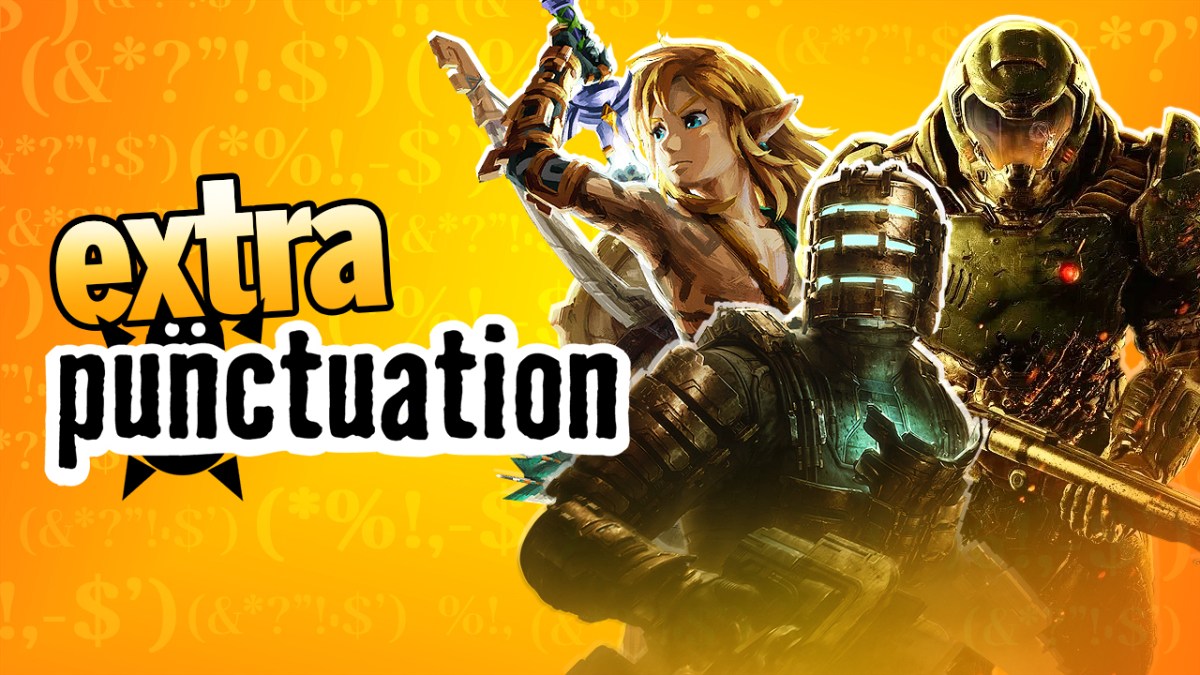This week on Extra Punctuation, as the Dead Space remake joins the trend of doing away with speaking protagonists, Yahtzee examines whether the era of the silent protagonist is over in video games.
Extra Punctuation Transcript
So the Dead Space remake came out recently to calmly and matter-of-factly condemn the Callisto Protocol to the dustbin of memory forever, and the big question was whether it was a full ground-up remake along the lines of the RE2Make or Black Mesa, or merely a remaster, a copy paste of the assets with a quick squirt of HD Mr Sheen. The truth lay somewhere in the middle. It’s mostly the same layout spruced up but with a number of significant design choices tweaked to be more in line with modern sensibilities. Most notably, the main character Isaac Clarke actually talks now, and isn’t a silent protagonist.
And that made me wonder: is gaming, culturally, moving away from the concept of the silent protagonist? I’ve certainly observed that the trend in triple-A realms has leant more towards constant verbal diarrhea lately, so is the silent protagonist a thing of vanishing relevance in modern times? To answer that we should consider how they came about as a cliche, and what purpose they may still serve.
Well, it’s fairly easy to answer how they came about – because they were the default at first. Speech and dialogue required precious memory that early games couldn’t spare and frequently dialogue wasn’t even necessary for the gameplay. As was the case with almost all of Nintendo’s properties, your Mario and your Link and your Samus Aran. Silent protagonists only became a quote-unquote thing when video games reached the point of being perfectly capable of giving speech to the main character but chose not to for stylistic reasons. The Nintendo characters mostly remained silent after the dawn of CD audio, probably because they had been established as silent in the old days and whenever they did try to give them voices it always felt a bit iffy. Reference the Zelda CDi games. And Metroid Other M. Although feeling iffy was the least of those game’s problems.
So disregarding legacy characters who were silent before being silent was cool, what was the first case of an Isaac Clarke type mute who didn’t speak despite existing in a world where they should by rights have been perfectly capable of speech?
Well, Wikipedia seems to think Myst was the first notable example of the silent protagonist in the age of speech, and fair enough, there are multiple characters in the game that talk to you in full on voiced FMV cutscenes and your dude just mutely boggles at them the whole time. Myst was following the grand tradition of PC adventure games that was always the case in stuff like Infocom’s classic text adventures, where the protagonist is an almost complete cipher, into which we are expected to utterly project ourselves. Don’t dwell on the protagonist of Myst because the protagonist of Myst is literally you, the player, and giving them any kind of face or voice would have destroyed that effect. I always wondered if the game expected me to supply my side of the dialogue at home. You know, wait ’til the dude stops talking and then ask pointed questions like “Why are you in a book?”
So silent protagonist acting as complete audience stand-in is understandable, but before long a new kind of silent protagonist appeared, one that we weren’t intended to fully project ourselves onto because they had characterisation and a face. The Doom marine, for example. Not only is it hard for the players to identify with a half-crazed monster destroying force of nature with the ability to run at roughly the land speed record and a gun inexplicably extruding from the middle of their chest, they flat out put the face of the dude smack in the middle of the health bar, so he can scowl at you if you even think about projecting yourself onto him.
But in that case the Doom marine was a lone survivor behind enemy lines; there was no one for him to talk to and not much reason for him to talk as it would give away his position for one thing, not that any of that ever stopped Duke Nukem. I wanna say that the concept of the silent protagonist who is established as a specific character with a face, and living in a world where other characters talk and interact with them and it would make sense for them to reply, was championed by good old Gordon Freeman in the original Half-Life. With Half-Life setting the bar for consistent narrative in first person shooters, we found ourselves forced to wonder how someone incapable of basic social interaction managed to earn a PhD and land a job doing top level science in a government facility.
Actually, in the original Half-Life and its spinoffs there was a question mark hanging over whether or not the protagonist was speaking. There’s a moment in Half-Life Blue Shift where a character directly questions the protagonist, then pauses, then reacts like he got an answer. So maybe Gordon wasn’t a literal in-universe mute and we just couldn’t hear his voice for some stylistic reason or other. Besides, when every other person in the game is a generic scientist or guard and none of them have any individuality, there’s a clear de-emphasis on characterisation that makes Gordon’s absent personality stick out less.
All of which went out of the window when Half-Life 2 came along. Suddenly the generic copy pasted scientists were replaced by specific characters with distinct personalities who were constantly jawing it up with each other and gushing at how impressed they are by Gordon and his wordless nobility. And now we knew Gordon literally wasn’t talking because Alyx Vance lampshades it. “Man of few words, aren’t you?”
So what purpose did it serve for Gordon to maintain stubborn silence at this point? Well, I’m reminded of the classic quip “Better to stay quiet and be thought an idiot than to open your mouth and remove all doubt.” While you can’t fully project yourself into Gordon you can project your own idea of what his personality’s like. If he said anything that might shatter our illusions. Especially if he said something cringy like when JC Denton goes A BOMB in Deus Ex. Except, you know what? No. That is complete bollocks. It’s like saying Jason Voorhees wears a mask the whole time in case people want to imagine he looks like Ryan Reynolds. That’s just an excuse for lazy writing.
Because in Half-Life 2 Gordon does have a personality, it’s a personality by omission that you pick up from the reactions of people around him. And that personality is a stubborn antisocial dickweed who can’t even do the common courtesy of responding to people who are talking to him. And this distracts from the story. It creates dissonance between the way other characters seem to perceive Freeman and the way he acts like a sullen teenager at a wedding. You wonder how Dr. Kleiner can keep talking at him with such enthusiasm in the face of absolutely zero feedback or acknowledgement. You wonder what Alyx Vance and the rest of the human resistance are seeing when they hold him up as a messianic figure of devotion.
If anything it feels like Gordon’s muteness in Half-Life 2 onwards is used as a self-effacing nostalgic gag poking fun at the way we used to do things. Same energy as the bit in Jak and Daxter 2 when the previously mute protagonist suddenly reveals a voice. Or the bit in Saints Row 2 when fun is poked at how the Boss was silent in the previous game and now talks for no established reason. Or the bit in GTA: San Andreas when the silent protagonist of GTA 3 is brought out for everyone to mock. All of which was part of a pattern of games turning on silent protagonism as it became more of a distraction than something plot-justifiable, and enough time has passed now that even as a gag it no longer lands.
So can it still serve any purpose? Well, I can think of a couple of justifications for it in a modern context. In a first person shooter with particularly hectic action and many jabbering NPCs, layering on another disembodied voice would probably only be more confusing. So it makes sense in something like Call of Duty 4 or High on Life. And also relating to High on Life it makes sense in comedy games where the plot is focussed on the NPCs and their dialogue and the silent protagonist is playing the part of the straight man. So it still works in the Portal games and possibly also the Ghostbusters game adaptation from 2009. I think the protagonist of that game was struck dumb with astonishment that they’d somehow gotten all four original actors to agree to be in it.
So in summary I guess I entirely support Dead Space’s decision to let Isaac Clarke out of the personality closet, because there really was no justification for it in the first place. Certainly not in a narrative third person game with a completely non-comedic tone where NPCs were frequently talking at him and he could have been saying important things like “Why do I always have to be the one going into monster-haunted territory by myself while you all hoard the snacks in the monitoring room? And do you have any Febreze? I’ve tanked thirty-seven jumpscares this morning and my spacesuit trousers are starting to smell like a sewage worker’s armpit.”






Published: Feb 23, 2023 12:00 pm